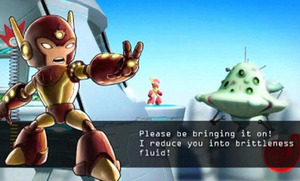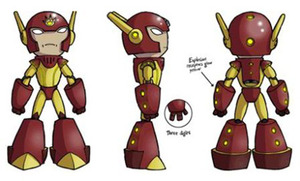Curve Interview: For Country and Console
April 10, 2010 | 10:23
Companies: #curve-studios #igf #indie #sony #steam

Curve Interview: For Country and Console
All this week we’ve been looking back at history and state of the UK games industry – because that’s what Made in the UK Week is all about. Mostly though, we’ve been focusing on the PC and home computer market, from the BBC Micro to modern day.That’s only a small part of the picture though – consoles are becoming increasingly important and companies such as Sony and Microsoft are quickly learning how profitable and easy it can be to tap into smaller, independent teams. Teams such as Curve Studios, whose latest game, Explodemon, quickly went from being an Independent Games Festival entrant to a PlayStation Network exclusive.
We caught up with the folks at Curve Studios to try and find out more about their development process and what they think of digital storefronts such as PSN, Steam and XBLA.
Bit-tech: Hi! Let’s start simple, can you explain to us who you are, what you do, who you work for and how you would plan to survive a Zombie Apocalypse?
Jonathan Biddle: I'm Jonathan Biddle, most commonly referred to as Bidds, and I'm the Design Director for Curve Studios. I'm not sure I'd have a hope of surviving the Zombie Apocalypse because I seem to catch everything going before everyone else; I've probably got the best chance of being the source of the Zombie Apocalypse.
Jason Perkins: Hi, I'm Jason Perkins, Managing Director at Curve. I'm not sure how I'd survive a Zombie Apocalypse, but we have people to look after that for us.
BT: One thing we’ve mentioned a lot this week is the sort of anarchic humour that often features in British games, while American games seem more concerned with epic action and Japanese titles focus more on purified game mechanics and story. Do you think that’s a fair assessment and where do you think that love for wacky, unconventional humour stems from?
JB: It's true to an extent, but the gradual internationalisation of games has seen influences from the East and the US work their way into British productions too. We've learnt better how to compete on the global stage, while somehow maintaining a Britishness in our games.
Many GTA players are unaware of the game's Scottish origin, for example, and while the series does outwardly appear Americanised, it is ripe with British sarcasm and satire. I think this is something that we do in many of our best games; we like our titles to be deeper than they appear, to have many facets. Maybe this is because it's a reflection of the British as a whole and how centuries of integrating with other cultures has affected us. This is probably what's created our unique sense of humour too.
BT: Curve has obviously worked a lot of humour into it’s own games. Is that something you actively try to foster when coming up with a new game concept? What’s your development process for a new title like?
JB: While it does seem to make it's way in more often than not, humour isn't something we consciously try to get into all of our games. Partially it's a natural extension of the gameplay we're aiming to create. We like to make people smile when they play, and humour certainly has its part to play in creating a pleasant play experience. The atmosphere in our office also definitely contributes to it too - we just like to have a laugh!
We don't really have a standard process for developing a new title though. Historically we start with the germ of an idea and work up into something unique, and then flesh it out through discussion.
The process of moving an idea from paper to a playable prototype differs depending on who we're working with. Explodemon's gameplay was worked up almost to completion as a spare time project before we even thought about it becoming a full title, while with other titles we've started from scratch with nothing but a light description of what we're aiming for, and organically found the fun along the way. It's not always possible to work like that, but it's certainly given us the best results when it comes to gameplay.
BT: How important is it to developers such as yourself to find a unique hook or mood for game? We often hear that launching a new IP is one of the hardest things to do in the industry.
JB: The hook is everything in a concept, and it has to be unique or there's no point in its existence. We simply don't like making games that are the same as everyone else's. It's really our own pride that makes us do this, and we just hope that in trying to create something that's different, we bring the players along with us; that they appreciate what we're trying to do.
We realise that we're really only known for the Buzz PSP titles we’ve worked on, and that it may sound strange to shout about this facet of the company, but we feel that this perception will change when we are able to reveal some of the stuff we've been working on for the last few years.

MSI MPG Velox 100R Chassis Review
October 14 2021 | 15:04













Want to comment? Please log in.